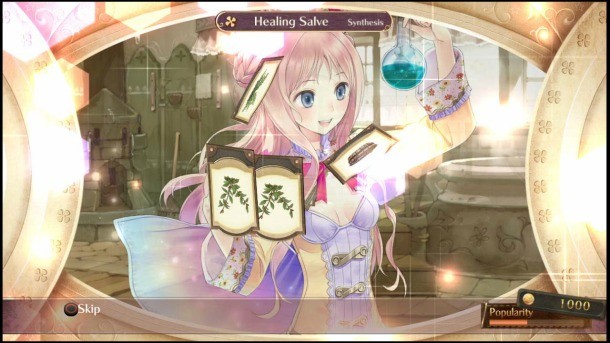Our extra-large special edition is here. Subscribe today and receive the 25% longer issue at no extra cost!
RPG Spotlight: Atelier

One of the questions readers ask me most is if they would like a particular series. As a way to provide the answer and celebrate beloved franchises, RPG Spotlight gives a concise overview of the elements that give a franchise its heart and soul.
In this edition, I take a look at Gust’s Atelier franchise. The charming series has captivated a niche, yet dedicated audience by putting them on a quest to overcome evil by gathering ingredients and mastering alchemy. For those who love constantly progress and improving their creations, Atelier scratches this itch admirably, while simultaneously providing loveable characters and inviting visuals.
Claim To Fame

In many RPGs, you’re constantly buying better equipment and healing items, but Atelier tasks you with creating them instead. Traversing the world in search of hidden materials and stumbling upon powerful components to enhance power is gripping, with new discoveries around every corner. While the series started off more lighthearted (barrel!), as it progressed into the PlayStation 3 era, it became well known for its female protagonists and their coming-of-age stories. Still, the franchise has hardly lost its humor or eccentricity, with characters like overzealous scientist Marc McBrine to keep you entertained. Atelier has also held fast to the turn-based battle system, but each entry continues to refine it, with combat mastery coming from combo attacks and creating items like bombs.
Play If You Like

You must have a love for customization, steady progression, and formulaic gameplay to appreciate the Atelier games. Those who enjoyed Dark Cloud 2, Recettear: An Item Shop's Tale, Harvest Moon, or Rune Factory might find Atelier their next obsession.
History Catch-Up

The Atelier series started out in the PS1 era with two releases, but didn’t make its way to our shores until the PlayStation 2. It was the sixth entry before NIS America introduced North American audiences to 2005’s Atelier Iris: Eternal Mana. The Iris arc spanned three games, and while reviews were mixed, strong sales allowed publisher NIS America to bring over both Mana Khemia games, spin-offs of Atelier. I should warn that these alchemical adventures are low budget, but still extremely charming. The art style has continued to improve, evolving from 2D sprites to detailed 3D models.
NIS America continued to publish the Atelier games into the PlayStation 3 era, but lost out when Gust was acquired by Tecmo Koei in 2011. This was also around the time the series was making the jump to Vita, re-releasing the PS3 title Atelier Meruru on the handheld. Recent titles have continued to retain the franchises’ hallmarks, but have focused even more on female protagonists tackling heavier issues like death and growing up. The upcoming Escha & Logy: Alchemists of the Dusk Sky, has two playable protagonists (one female, one male) to choose from and each path provides a distinct experience. Escha’s path is more on par with the previous PlayStation 3 Atelier titles, while Logy’s provides a more general RPG experience.
Good Starting Points

Atelier Totori: The Adventurer of Arland for PS3 and Vita is one of the better stories to come out of the series, so I recommend trying to go there first. The upcoming Escha and Logy has the most refined alchemy mechanics to date, while still being extremely newcomer friendly. The only aspect you’re missing by not touching earlier entries is that many characters make cameos in the other games. This does not make or break to the experience, but if you’re someone who likes recognizing past characters and seeing what they’re been up to, you’ll be missing out there. The Atelier games ease you into them slowly, so you shouldn’t feel lost no matter which entry you select for your first bout with the franchise.
Criticisms

The turn-based combat hasn’t always been Atelier’s strongest offering, but Gust continues to improve on it. In my opinion, the system is full of great ideals with support attacks and defending. If you’re not into anime, the stereotypical characters can grate. I’ll say this - sometimes the writing does go for the easy joke. I’ve found the characters to be hit or miss in all the entries; the stories share a similar sentiment. The biggest barrier that prevents people from trying the series is the time limit. You have a certain number of in-game days to complete tasks and everything takes time - from traveling to crafting items. I wouldn’t let this fear prevent you from playing the games. The time restriction is extremely generous, making it hard to back yourself into a corner you can’t get out of.
On The Horizon

The latest entry Atelier Escha & Logy: Alchemists of the Dusk Sky is due out on March 11. This is the second entry in the Dusk cycle with Atelier Ayesha: The Alchemist of Dusk proceeding it. The Vita version of Atelier Ayesha is due out in Japan next month, but Tecmo Koei has not yet confirmed plans to bring it to the U.S. Since Temco Koei has published the past Vita versions, it’s hard to believe the company would change its tune. Time will tell if the series has a life on new-gen consoles, or if handhelds will be its future.
Check out our previous RPG Spotlights on Tales, Disgaea, Ys, and Suikoden.

Get the Game Informer Print Edition!
Explore your favorite games in premium print format, delivered to your door.
- 10 issues per year
- Only $4.80 per issue
- Full digital magazine archive access
- Since 1991









